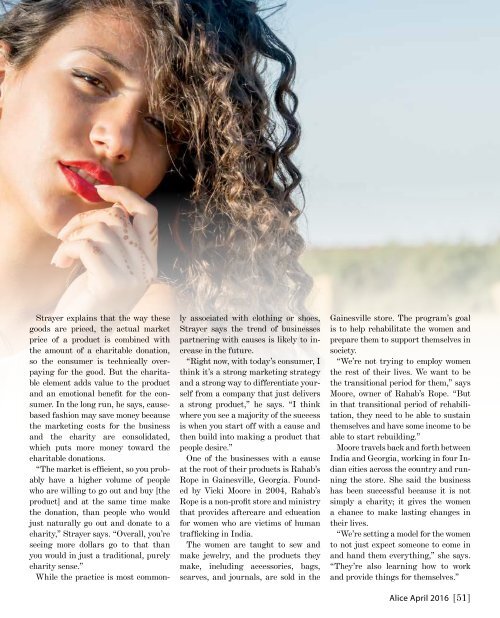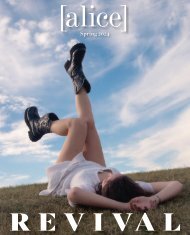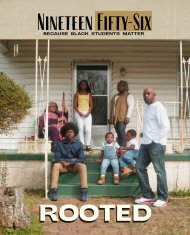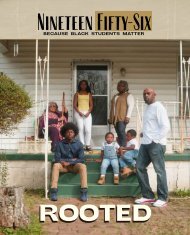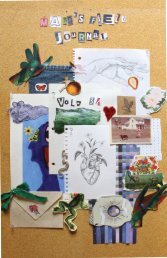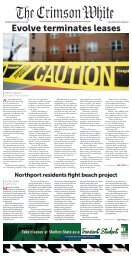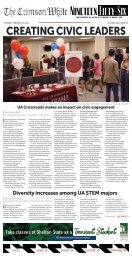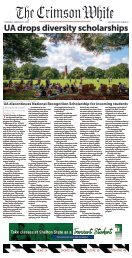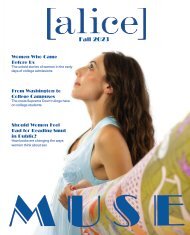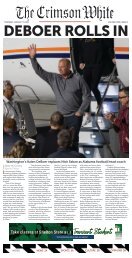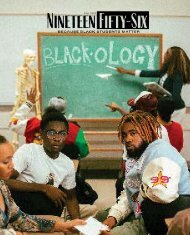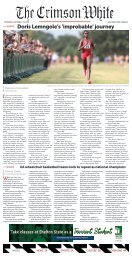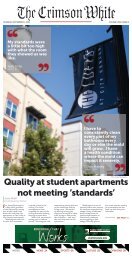Alice Vol. 1 No. 2
Published by UA Student Media April 2016.
Published by UA Student Media April 2016.
Create successful ePaper yourself
Turn your PDF publications into a flip-book with our unique Google optimized e-Paper software.
Strayer explains that the way these<br />
goods are priced, the actual market<br />
price of a product is combined with<br />
the amount of a charitable donation,<br />
so the consumer is technically overpaying<br />
for the good. But the charitable<br />
element adds value to the product<br />
and an emotional benefit for the consumer.<br />
In the long run, he says, causebased<br />
fashion may save money because<br />
the marketing costs for the business<br />
and the charity are consolidated,<br />
which puts more money toward the<br />
charitable donations.<br />
“The market is efficient, so you probably<br />
have a higher volume of people<br />
who are willing to go out and buy [the<br />
product] and at the same time make<br />
the donation, than people who would<br />
just naturally go out and donate to a<br />
charity,” Strayer says. “Overall, you’re<br />
seeing more dollars go to that than<br />
you would in just a traditional, purely<br />
charity sense.”<br />
While the practice is most commonly<br />
associated with clothing or shoes,<br />
Strayer says the trend of businesses<br />
partnering with causes is likely to increase<br />
in the future.<br />
“Right now, with today’s consumer, I<br />
think it’s a strong marketing strategy<br />
and a strong way to differentiate yourself<br />
from a company that just delivers<br />
a strong product,” he says. “I think<br />
where you see a majority of the success<br />
is when you start off with a cause and<br />
then build into making a product that<br />
people desire.”<br />
One of the businesses with a cause<br />
at the root of their products is Rahab’s<br />
Rope in Gainesville, Georgia. Founded<br />
by Vicki Moore in 2004, Rahab’s<br />
Rope is a non-profit store and ministry<br />
that provides aftercare and education<br />
for women who are victims of human<br />
trafficking in India.<br />
The women are taught to sew and<br />
make jewelry, and the products they<br />
make, including accessories, bags,<br />
scarves, and journals, are sold in the<br />
Gainesville store. The program’s goal<br />
is to help rehabilitate the women and<br />
prepare them to support themselves in<br />
society.<br />
“We’re not trying to employ women<br />
the rest of their lives. We want to be<br />
the transitional period for them,” says<br />
Moore, owner of Rahab’s Rope. “But<br />
in that transitional period of rehabilitation,<br />
they need to be able to sustain<br />
themselves and have some income to be<br />
able to start rebuilding.”<br />
Moore travels back and forth between<br />
India and Georgia, working in four Indian<br />
cities across the country and running<br />
the store. She said the business<br />
has been successful because it is not<br />
simply a charity; it gives the women<br />
a chance to make lasting changes in<br />
their lives.<br />
“We’re setting a model for the women<br />
to not just expect someone to come in<br />
and hand them everything,” she says.<br />
“They’re also learning how to work<br />
and provide things for themselves.”<br />
<strong>Alice</strong> April 2016 [51]


